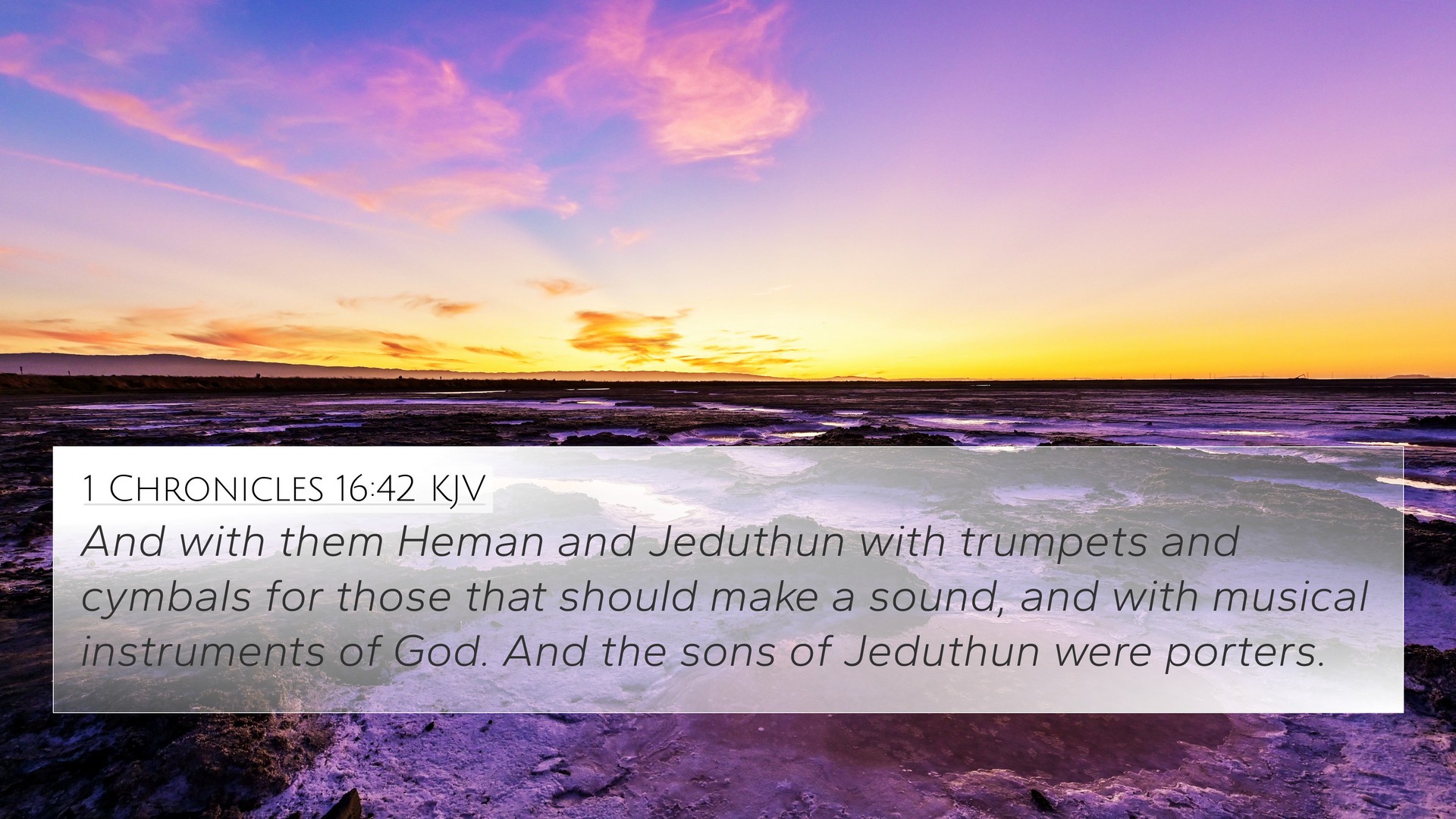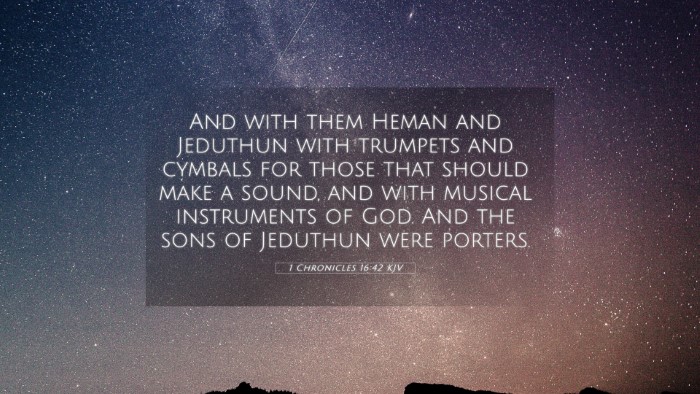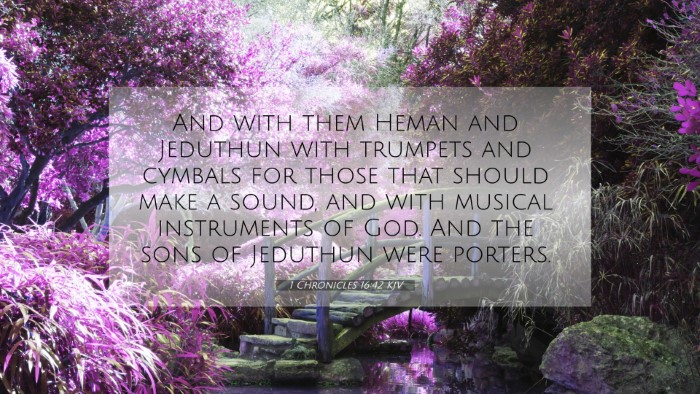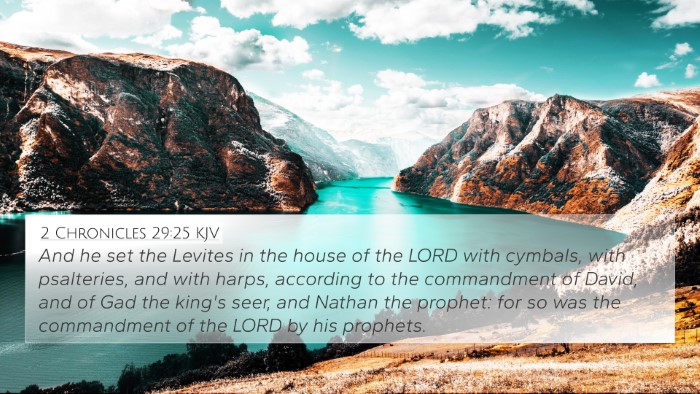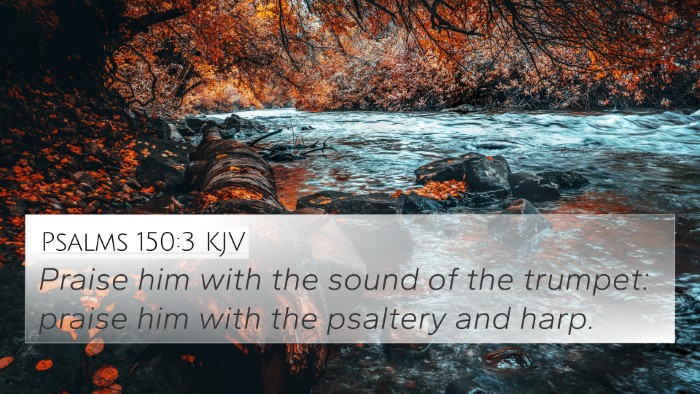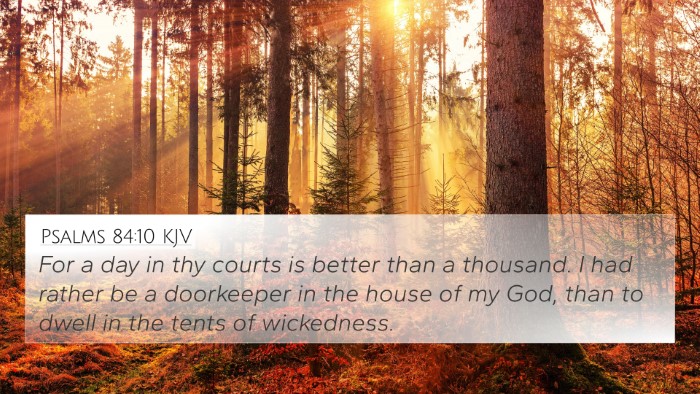Understanding 1 Chronicles 16:42
Verse: 1 Chronicles 16:42 - "And with them Heman and Jeduthun, and the rest that were chosen, who were expressed by name, to give thanks to the Lord, because his mercy endureth forever."
Summary of Meaning
This verse highlights a pivotal moment in the history of Israel, emphasizing the importance of worship and thanksgiving to God. Heman and Jeduthun, who are mentioned here, were prominent leaders of music in the Temple, signifying that worship is not just an act of personal devotion but a communal and structured practice that involves leadership and cooperation.
Insights from Public Domain Commentaries
- Matthew Henry: Henry emphasizes the significance of organized worship in the life of Israel. He points out that the expression of thanks to the Lord is central to the believer's life, as it reflects an understanding of God's enduring mercy.
- Albert Barnes: Barnes notes the choice of musicians—Heman and Jeduthun—reflects the structured nature of worship in Israel. This indicates that music played a vital role in the expression of gratitude towards God and that it was performed by those who were specially designated for the task.
- Adam Clarke: Clarke elaborates on the concept of expressing gratitude as a fundamental part of worship. He also highlights the significance of the phrase "his mercy endureth forever," suggesting that it underscores the eternal nature of God's mercy, which invites constant remembrance in worship.
Significance of Thanksgiving in Worship
Thanksgiving is a recurring theme throughout the Scriptures, and 1 Chronicles 16:42 exemplifies this by bringing together leaders in worship to acknowledge God's mercy. This sets a precedent for communal worship and collective gratitude that resonates through subsequent Biblical texts.
Cross-Referenced Bible Verses
To deepen your understanding of 1 Chronicles 16:42, consider these related Bible verses:
- Psalms 100:4: “Enter his gates with thanksgiving and his courts with praise; give thanks to him and praise his name.”
- Psalms 136:1: “Give thanks to the Lord, for he is good. His love endures forever.”
- Colossians 3:17: “And whatever you do, whether in word or deed, do it all in the name of the Lord Jesus, giving thanks to God the Father through him.”
- 1 Thessalonians 5:18: “Give thanks in all circumstances; for this is God’s will for you in Christ Jesus.”
- Hebrews 13:15: “Through Jesus, therefore, let us continually offer to God a sacrifice of praise—the fruit of lips that openly profess his name.”
- Philippians 4:6: “Do not be anxious about anything, but in every situation, by prayer and petition, with thanksgiving, present your requests to God.”
- Ephesians 5:20: “Always giving thanks to God the Father for everything, in the name of our Lord Jesus Christ.”
Thematic Connections with Other Scriptures
This verse can further be examined through thematic connections with other biblical passages. It showcases the overarching theme of gratitude found in both the Old and New Testaments, illustrating a continuity in spiritual practice throughout scripture.
Common Themes of Mercy and Worship
- God's Mercy: The enduring nature of God’s mercy is a cornerstone of faith, depicted in several verses such as Psalms 136.
- Collective Worship: The importance of community in worship is seen in Acts 2:42-47 where believers gathered together for prayer and breaking of bread.
- Leadership in Worship: The appointment of leaders in worship, akin to the roles of Heman and Jeduthun, is echoed in 1 Timothy 3:1-13, emphasizing the need for qualified leaders in spiritual matters.
Conclusion
The verse 1 Chronicles 16:42 stands as a powerful reminder of the importance of thanksgiving and the need for organized worship within the community of faith. It lays a foundation for understanding how gratitude towards God permeates the entirety of Scripture, guiding believers in how to express their faith through thanksgiving.
